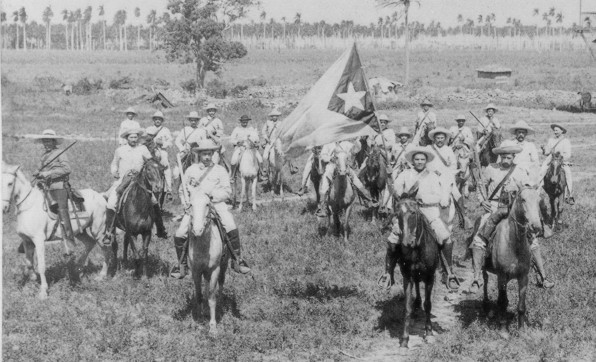|

Calvary of General Gomez' Army, Remedios Cuba
(from the Collection of the US Library of Congress)
 Origin of the name "Mambí" Origin of the name "Mambí"
According to the noted Cuban Historian Carlos Márques
Sterling, the word "Mambí" is of Afro-Antillan origin and was
applied to revolutionaries from Cuba and Santo Domingo (now Dominican
Republic) in the XIX Century.
According to the fiction writer Elmore Leonard, in his
adventure novel Cuba Libre, the word Mambí comes
from Eutimio Mambí, a leader who fought the Spaniards in Santo
Domingo 50 years previously. The Spanish soldiers, noting the similar
machete yielding tactics of the Cuban revolutionaries, started referring
to them as "the men of Mambí", which later was shortened to "Mambís"
or "Mambíses".
In Cuba the word "Mambí" is reserved exclusively
to denote the patriotic soldiers that fought against Spain in the Cuba
War of Independence 1895-1898.
 Women in the Mambí Army Women in the Mambí Army
During the course of our transcription, several people noted
with surprise that some of the soldiers had female names. A few even had
titles of "Señora" so there is no doubt that they were women (see
A #104 and B #5391). I don't recall any mention of women in the Cuban
Revolutionary Army in my youth or in history books, but if you think about
it it is really not at all surprising.
Some of the women (see A #104) were part of the "Sanidad
Militar" (Medical Corps). Others formed part of regular Army units. Some
of them achieved officer rank (see A #104 and B #5391 for two Capitans).
At the time of the Cuban Revolution, the policy of the Spanish
Government, established by the brutal general Valeriano Weyler, was to
collect all the inhabitants of rural zones and forcefully move them to
urban centers. This was the infamous "Reconcentración" which led
to mass starvation and deaths in large numbers.
Faced with such a situation it is not surprising that entire
families, women included, would join the Revolution. (one example of a
brother and a sister fighting together is B #6180 and 6186, another of
3 brothers and a sister is L #35677, 35680, 35683 and 35684). It is reasonable
to assume that if the males in one family would join the Revolution, that
the rest of the family would be placed in danger of retribution from the
Spanish authorities and the "Voluntarios" (Spanish sympathizers which
formed militias to fight the Cuban revolutionaries).
 First Names From Another Era First Names From Another Era
One of the fun things of doing the transcriptions is seeing
the unusual first names of some of the Soldiers and their fathers and
mothers. Many of these names were popular at one time but have fallen
in disuse. Some of the more unusual ones we ran into while transcribing
pages were:
| Men's Names |
Women's Names |
| Agripino |
Cirilo |
Idelfonso |
Antolina |
| Aguedo |
Clodomiro |
Indalecio |
Baldomera |
| Americo |
Eduvigis |
Limbano |
Belen |
| Antoliano |
Eleuterio |
Loreto |
Bernarda |
| Apolonio |
Estanislao |
Meliton |
Buenviaje |
| Aquilino |
Eufemio |
Modesto |
Casimira |
| Belonio |
Eustasio |
Narciso |
Chumba |
| Bernabe |
Evangelista |
Prisciliano |
Cipriana |
| Bolivar |
Evaristo |
Prudencio |
Cresencia |
| Bonifacio |
Ezequiel |
Sabino |
Eufemia |
| Buenaventura |
Faustino |
Serapio |
Fabiana |
| Candelario |
Feliciano |
Silverio |
Fermina |
| Candido |
Fermin |
Trino |
Hilaria |
| Catalino |
Filidor |
Venancio |
Lupersia |
| Ceferino |
Florentino |
Vereno |
Lutgarda |
| Celestino |
Genaro |
Vidal |
Petronila |
| Cipriano |
Gumersindo |
|
Quirina |
I'm sure you can find others even more unusual by sorting
on the "Name", "Father" or "Mother" columns.
 Links to Pictures and Other Sites Links to Pictures and Other Sites
Here are some links to pictures, history and stories of
the Cuban War of Independence:
- (history & photos)
- (Compiled
by J.A. Sierra)
- (photo)
-
- (Library of Congress -
mostly re-enactments)
- (from Spain)
 Books About the War of Independence Books About the War of Independence
Although there are many books on the Spanish-American War
from the US point of view, not many cover the years of struggle of Cubans
against the Spanish Colonizers. A few selected books are shown in our
list of .
|
 Links to Pictures and Other Sites
Links to Pictures and Other Sites Books About the War of Independence
Books About the War of Independence
